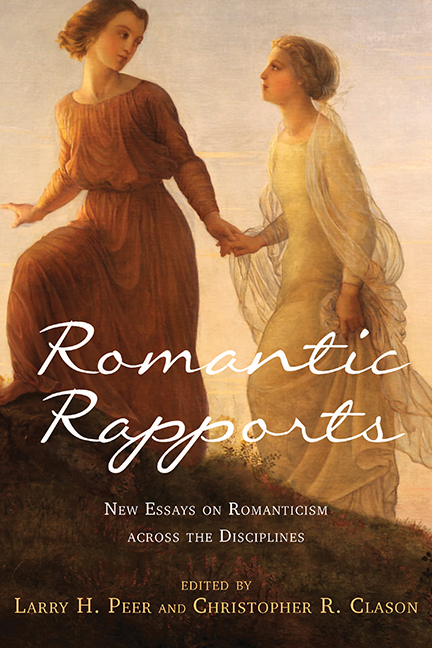Book contents
- Frontmatter
- Dedication
- Contents
- Acknowledgments
- Introduction: The Polyvalence of Romanticism
- Part I Romanticism and the Literatures
- 1 Werther and Harold: Rapport and Difference in the Literary Articulation of the Romantic Subject
- 2 Balzac and the French New Wave: A Problematic but Enticing Relationship
- 3 Romantic Relations and Constructive Affinities: Notions of Family in Kater Murr
- 4 Françoise's Way and Bloch's Way: Two Paths of French Romanticism in Proust's À la recherche
- Part II Romanticism, Music, and the Visual Arts
- Part III Romanticism and Science, Technology, Philosophy
- Notes on the Contributors
- Index
3 - Romantic Relations and Constructive Affinities: Notions of Family in Kater Murr
from Part I - Romanticism and the Literatures
Published online by Cambridge University Press: 30 August 2017
- Frontmatter
- Dedication
- Contents
- Acknowledgments
- Introduction: The Polyvalence of Romanticism
- Part I Romanticism and the Literatures
- 1 Werther and Harold: Rapport and Difference in the Literary Articulation of the Romantic Subject
- 2 Balzac and the French New Wave: A Problematic but Enticing Relationship
- 3 Romantic Relations and Constructive Affinities: Notions of Family in Kater Murr
- 4 Françoise's Way and Bloch's Way: Two Paths of French Romanticism in Proust's À la recherche
- Part II Romanticism, Music, and the Visual Arts
- Part III Romanticism and Science, Technology, Philosophy
- Notes on the Contributors
- Index
Summary
“Kindred Brutes”
FOR MILLENNIA WESTERN EUROPEAN CULTURE considered the human to be superior to and categorically separate from other biological entities. For Aristotle, this was the result of the human being's “rational and sentient” soul, while for Christians the soul took on a far more transcendental and defining significance—placing humanity in a privileged and powerful position with respect to the rest of the biological world (Coleman, 96–97). However, during the eighteenth and early nineteenth centuries, questions regarding the relationship among species were becoming more complex, especially as natural philosophers (by the middle of the nineteenth century they would be called “scientists”) began to consider humans as a part of the animal world rather than superior to it (Kenyon-Jones, 1), and to see animals as “kindred brutes” (Byron, quoted in Kenyon-Jones, 11). Sometimes differences of scholarly opinion about how animals could be related to humans erupted in protracted disputes, such as the struggle between Preformationists (those who believed that in the womb the embryos of various species were preformed and then merely grew) and the Epigeneticists (who insisted that embryos developed in utero from undifferentiated tissues). The observations of Carl Friedrich Kielmeyer (1765–1844) and Johann Friedrich Meckel (1781–1833) that the embryo of each species, including that of the human being, passes through morphological stages “recapitulating” the form of less-developed species (Bowler, 121–24; Coleman, 35–56) suggested that the various species were more closely related than had previously been imagined. New ideas regarding what Alexander Pope had celebrated, already in 1751, as “the Great Chain of Being” (Lovejoy, 60; Bowler, 63) came to the fore, not merely from the Enlightenment tendency to individualize, isolate, and analyze, and thus to consider “mind” to be essentially separate from nature, but rather from Romantic impulses to foreground connections and similarities among species, imaginatively synthesizing flora and fauna across species lines and locating mind “deeply implicated in the organic structure of nature” (Richards, 515).
- Type
- Chapter
- Information
- Romantic RapportsNew Essays on Romanticism across the Disciplines, pp. 49 - 65Publisher: Boydell & BrewerPrint publication year: 2017



